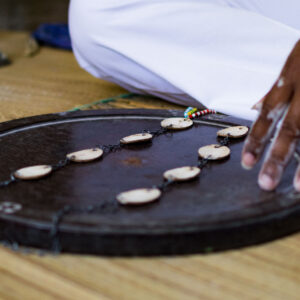
Symbolism and Attributes
Oshun is often depicted draped in shades of yellow or gold, symbolizing the warmth of the sun and the richness of the earth. Her symbols include the river, reflecting her association with freshwater, as well as the mirror and fan, representing beauty and feminine allure. Oshun is renowned for her captivating beauty, and her presence is said to evoke a sense of enchantment and joy.
Love, Beauty, and Fertility
As the Orisha of love, Oshun is associated with romantic and maternal love. Devotees turn to Oshun for guidance in matters of the heart, seeking her blessings for harmonious relationships, fertility, and the well-being of children. Her benevolent and nurturing qualities make Oshun a source of solace and support during times of emotional distress.
Oshun’s association with beauty extends beyond physical aesthetics to encompass the beauty of the soul and the natural world. Devotees invoke her presence to enhance their inner and outer radiance, fostering self-love and a harmonious connection with the world around them.
Cultural Significance and Worship
Oshun’s influence permeates various aspects of Yoruba culture, and her worship is expressed through vibrant festivals, rituals, and artistic endeavors. The annual festival dedicated to Oshun, known as the Osun-Osogbo Festival, draws devotees from far and wide to the sacred groves of Osogbo in Nigeria. The festival is a celebration of fertility, purification, and the life-giving properties of water.
Worshipers often visit rivers and streams, believed to be sacred to Oshun, to offer prayers, gifts, and symbolic offerings. The belief in Oshun’s connection to water underscores her role as a purifier and healer, washing away impurities and bringing forth renewal.
Oshun in the Afro-Caribbean Diaspora
The worship of Oshun has transcended geographical boundaries through the African diaspora, influencing traditions such as Santería and Candomblé. In these syncretic practices, Oshun is often associated with Catholic saints such as Our Lady of Charity or Our Lady of La Caridad del Cobre. This syncretic blending reflects the adaptability of Yoruba spirituality within diverse cultural contexts.
Oshun’s Relationship with Other Orishas
Oshun is considered a sister to other Orishas, and her relationships with them further enrich her character. She is often associated with Yemoja, the mother of all Orishas, emphasizing the interconnectedness of maternal and nurturing energies within the pantheon.
Conclusion
Oshun, the enchanting Orisha of love, beauty, and fertility, embodies the nurturing and life-affirming qualities of the divine feminine in Yoruba spirituality. Her enduring influence extends from the sacred groves of Nigeria to the diaspora, where devotees continue to seek her guidance, blessings, and the radiant energy that she imparts. As individuals turn to Oshun for love, beauty, and renewal, her timeless presence remains a testament to the enduring power of the divine feminine in the hearts and lives of believers.



